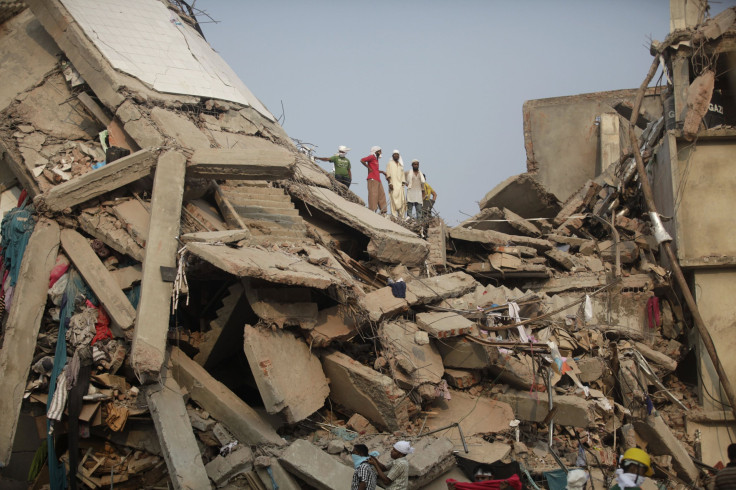Bangladesh Building Collapse: Opposition Demands Judicial Probe Of Disaster, As Owners Placed Under Arrest

The opposition Bangladesh National Party, or BNP, has called for an official judicial probe of the garment building collapse in Dhaka last week that killed more than 300 people and has raised serious questions about safety standards in the country’s economic infrastructure.
On Wednesday morning, the Rana Plaza building, a nine-story structure near the Savar Bus Stand, collapsed, killing hundreds and injuring more than 2,000, with at least 659 people still reported missing as of Friday afternoon. A total of five factories, where Bangladeshi laborers toiled to make T-shirts and other garments for Western consumers, were destroyed in the catastrophe. It is believed about 3,500 workers were in the complex at the time.
Rana Plaza was the worst such building collapse in Bangladesh’s 42-year history.
Allegations have also emerged about garment employees being forced to work in a dangerous structure with many cracks in the walls and tiles.
Now, senior BNP officials are claiming that the workers were “murdered” by being forced to work in an unsafe environment for “political reasons.”
M.K. Anwar, a member of the BNP’s standing committee, pointed out that one of the building’s owners, Mohammed Sohel Rana, is an activist in the Juba League, a political youth organization affiliated with the ruling Awami League party and its leader, Prime Minister Sheikh Hasina. (Hasina has denied Rana is connected to her party.)
Sohel Rana, who is currently a fugitive from the law, is the target of an arrest order by Home Minister Muhiuddin Khan Alamgir.
“Scores of bodies are being taken out of the debris of the building. The scene cannot be described in words,” Anwar told reporters at a press conference on Thursday, adding that the workers who died were promised their monthly wages on the day of the disaster.
"[The workers] were killed for political reasons,” he said.
Meanwhile, an estimated 10,000 garment workers and others rallied on the streets of Dhaka on Friday to demand the arrest of the owners of the Rana Plaza and the aforementioned factories that were deemed unsafe and raised concerns about worker safety.
"These are billion-dollar companies. They have a huge amount of power to change the way that building safety is accepted here," Gareth Price-Jones, the Oxfam charity's country director for Bangladesh, told Reuters.
Hasina has herself vowed that the factory owners will be punished for the lives lost and damages incurred and also ordered their arrests. Aside from the fugitive Sohel Rana, the other four owners are Mahbubur Rahman Tapas, Bazlus Samad Adnan, Mohammad Aminul Islam and Mohammad Anisur Rahman.
Two relatives of Rana have already been detained by authoritites in an effort to determine his whereabouts.
© Copyright IBTimes 2024. All rights reserved.











